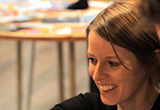 The NHS Health and Care Expo, held in Manchester last week, aims to be a leading event in healthcare. Although it primarily features speakers from across the health, voluntary, and private sectors, the Expo also had a number of patient-led sessions within its “Pop-Up University.”
The NHS Health and Care Expo, held in Manchester last week, aims to be a leading event in healthcare. Although it primarily features speakers from across the health, voluntary, and private sectors, the Expo also had a number of patient-led sessions within its “Pop-Up University.”
On day 1 of the Expo, I led a pop-up session on co-production, supported by patient leader Alison Cameron and GP Amir Hannan. I was originally asked whether I could provide some good examples of co-production and the impact it has had. Reflecting on this, however, it seemed to me that nice examples of co-production are presented relatively frequently at conferences of this sort, but do not necessarily bring about real change in practice. Moreover, while many people across the health service talk about co-production, very few truly understand what it means and even fewer truly attempt it. Puzzled as to why this is, I began to think of co-production as part of a broader change process within the health sector, and one that challenges the dynamics between clinicians, managers, and patients. As any management consultant will tell you, change is almost always met by some form of resistance. Identifying the nature of the resistance is crucial to overcoming it.
And so it was that I put the participants at my session to work answering the question “If we agree that co-production is a good thing, why doesn’t it happen more often?” Fearing that the initial answer to this question would only scratch the surface, we used an exercise called the “5 Whys” in which you seek to uncover the root of a problem by asking “why?” no less than five times.
Initially, almost everyone in the room touched upon culture. Many discussed the way in which doctors are trained and services are delivered. They argued that the medical system itself engenders a culture in which patients are viewed as recipients of treatment rather than individuals with valuable expertise and experience.
But, I asked, why does this happen? Indeed, there is research to suggest that treatments are better adhered to and services are more effective if they have been shaped by those who receive them.
A number of people then noted that change was challenging and often upsetting; participants also identified the unhelpful division between “us” (professionals) and “them” (the patients) that is driven by an unequal division of power. Some participants very honestly said that it was easier to “go through the motions of co-production”—for example, by bringing together a group of patients for a one-off meeting—than to undertake a project that might force them to fundamentally change they way they do things.
“And why is this?” I asked, wanting to push them further. The short answer was fear. Fear of what co-production really means and fear that it would be difficult and stressful when people already find work in the NHS difficult and stressful. Others spoke of the lack of support from professional peers, noting it can be very hard to take on this type of work when it isn’t broadly respected or adequately understood.
As we got deeper into our discussions, it also became clear that there remains much confusion about what co-production actually means. Many still equate it with Patient and Public Involvement (PPI) which, in most cases, involves capturing patient views or experiences so that the “professionals” can go off and do something about the issues raised—frequently in isolation.
We did not have time in the 45 minute session to get to the heart of the fear and confusion but I suspect, as with other forms of participatory work, that a desire to remain in control underlies much of it. Shifting power away from professionals requires different types of relationships and also means seeing patients as assets and resources rather than, as Alison put it, “bundles of need.”
You can’t change what you don’t understand and although we may not have solved the “puzzle of co-production” in 45 minutes, I do believe that the session pushed us further along than we were. Resistance to change is so often unspoken and covert, leaving those who believe in the change frustrated and confused. By identifying some of the sources of resistance, we are, hopefully, one step closer to overcoming them.
Ceinwen Giles is a director at Shine Cancer Support and a Trustee of the Point of Care Foundation. She also works as a consultant in the fields of patient involvement and experience and is an associate at Swarm.
Special thanks to Alison Cameron for her proof-reading of this piece.
Competing interests: I have received fees for consulting from GlaxoSmithKline UK. I’m a Trustee of Shine Cancer Support and the Point of Care Foundation. My speaking engagements have had travel reimbursed (but no other fees paid) by a number of organisations: King’s Fund, Macmillan, Lymphoma Association, NHS Employers, NHS Confederation.
